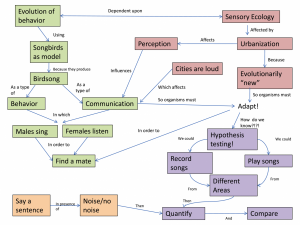As the fall semester of 2013 draws to a close, it is useful to reflect on what we have accomplished over the course of the semester. We the Writing Across the Curriculum fellows have led three main faculty workshops since September: Effective Assignment Design, Peer Review, and Effective Grading. Despite the three varied topics of these workshops, they share a common thread, which is the WAC philosophy of “writing to learn,” and in addition, their content overlaps nicely.
In order to highlight WAC principles, I wish to focus on one particular aspect of the effective grading strategies that Jake Cohen and I discussed in our workshop on Tuesday, December 12 (the last of the semester). We went over some techniques to improve student writing and work, most of which also incidentally result in reduced grading time, which is always welcome, especially at this end-of-semester crunch grading time. To view our workshop slides, please click here, and check out the handout. (You can also visit this page to download documents from all of our workshops.) We discussed minimal marking, supportive responding when writing comments on student papers, rubrics, and planning assignments ahead of time to make grading more efficient. This last category is closely related to the two previous workshops from this semester: assignment design, clearly, and also peer review, in that having students assess each others’ work can save time, and greatly improve student writing.
This assignment design category is also the “one particular aspect” that I choose to elaborate on for this post. Among the several techniques we suggested for planning ahead to make assignments more “gradable,” one sticks out as being particularly WAC-esque: the uncollected writing assignment. The value of this notion, which is generally under-utilized by faculty in all departments, is two-fold: It is easy to see how uncollected assignments decrease the overall amount of time we spend grading work, of course, but why assign them at all? The answer lies in the foundation of WAC philosophy, which is that people learn by doing—and more specifically, by writing. So, what kind of uncollected writing do we recommend you assign, how do you enforce such assignments without collecting them, and, finally, how do students “learn by writing”?
One of the best illustrations of this concept is provided eloquently by Toby Fulwiler in “Why We Teach Writing in the First Place”: “Writing the thought on paper objectifie[s] the thought in the world… [which] even happens when I write out a grocery list—when I write down ‘eggs’ I quickly see that I also need ‘bacon.’ And so on” (127). This concept works well for professors across the curricula: Think about assigning a five-minute, in-class free-write asking students to describe course content covered in the past month/week/hour, by way of ensuring that they can articulate it well for whatever type of exam they have coming up, and by way of allowing them to discover holes in their understanding of what you have covered so far. If you are concerned that they won’t oblige the assignment without the potential for reward, then you can choose, for example, to select three at random to read aloud in class, or to be posted on your Blackboard/OpenLab page that same evening.
We hope that those who incorporate this technique will ultimately find that the grading process of the final papers you assign will be ameliorated, in that the students have now had a chance to “practice” or “train” for the final writing process, something akin to athletes who could never run a marathon without similar training, without you having been required to grade an intermediary draft. Ideally, as students come across “holes” in their own comprehension of your course content, they may come to you with more questions, or make better use of your office hours. I know that they will arrive at a deeper understanding of your course material in the same way that I have done regarding WAC philosophy, in the process of writing out this blog post.
Happy Holidays!







